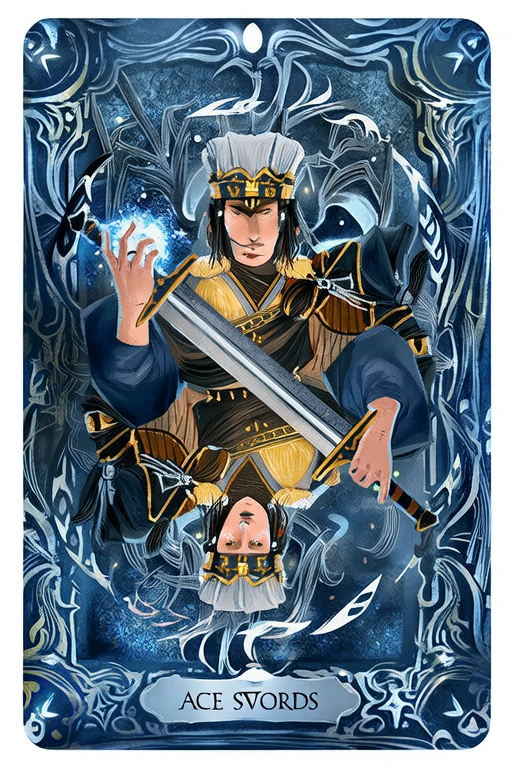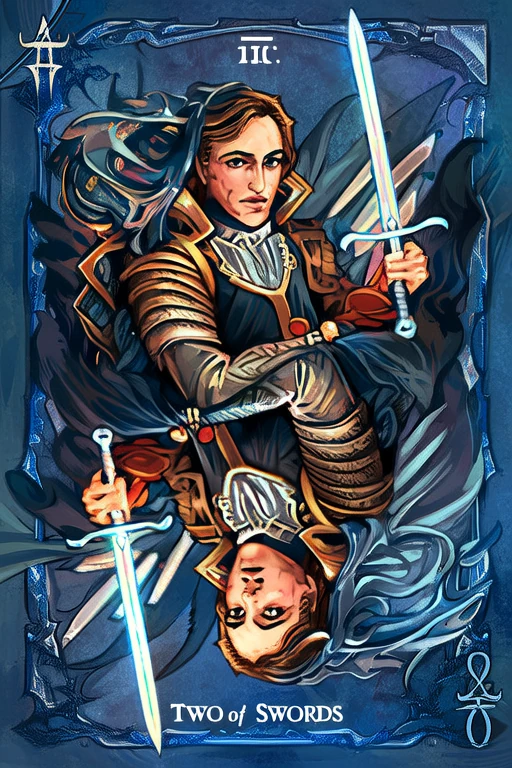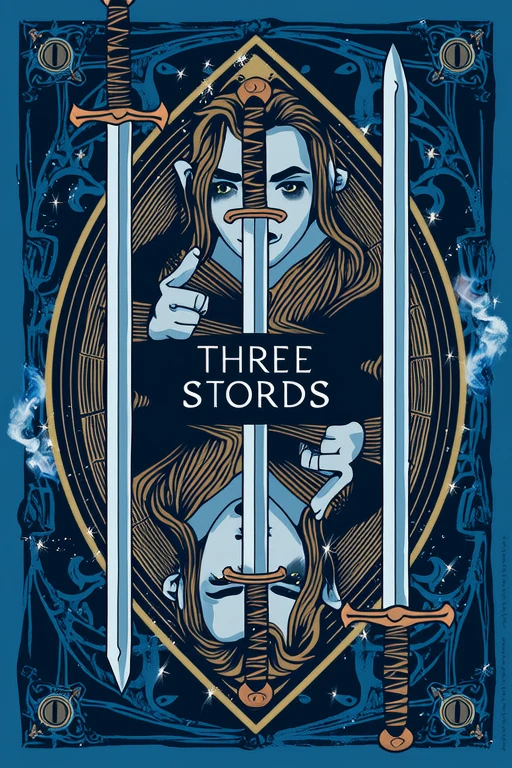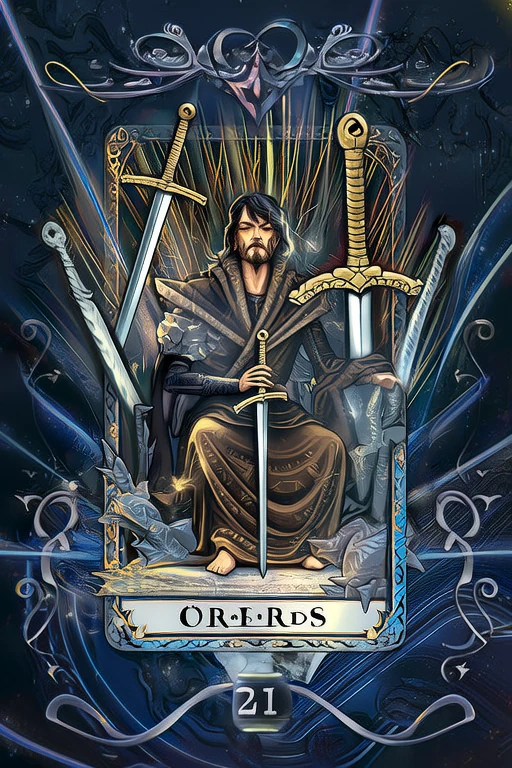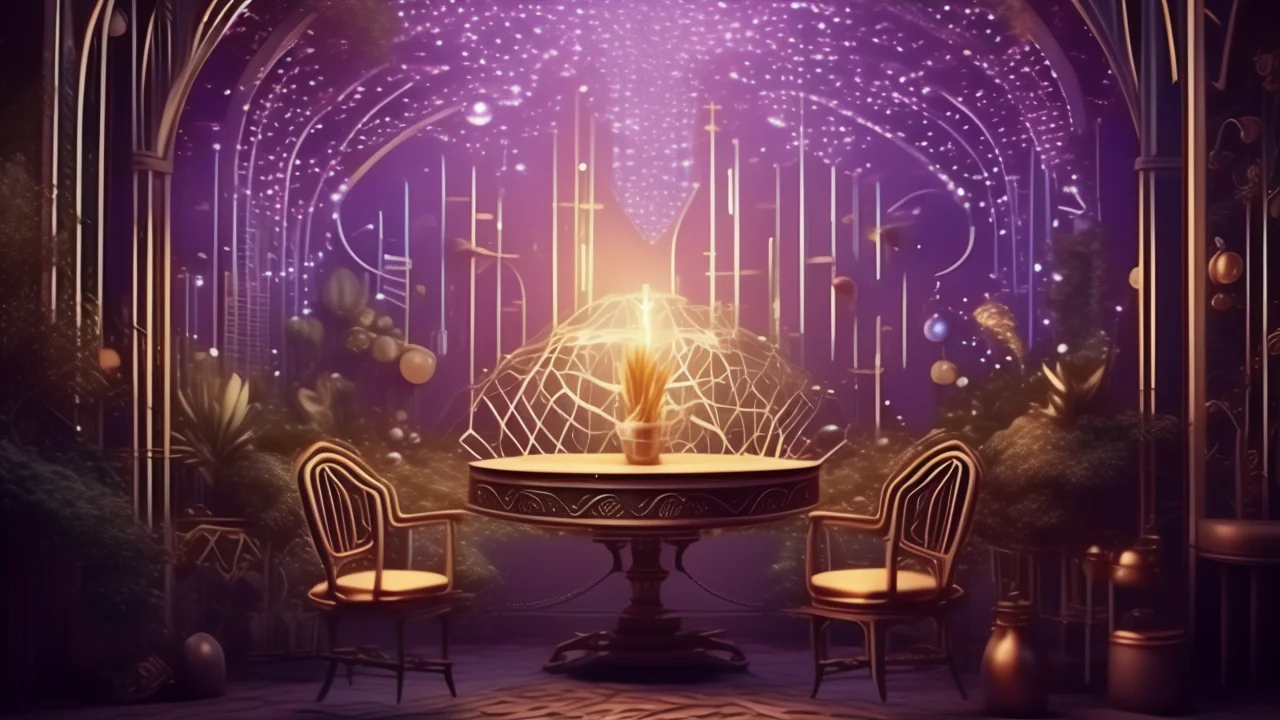
Nine of Swords
Discover the deep meaning of Nine of Swords with our free AI-powered tarot interpretation. Get instant, accurate readings based on advanced tarot knowledge.
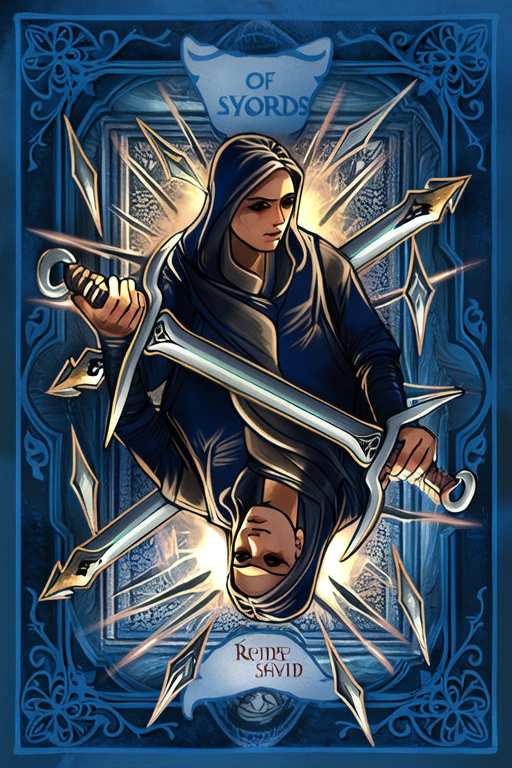
Keywords
Upright Meaning
Anxiety, hopelessness, trauma
Reversed Meaning
Inner turmoil, deep-seated fears, secrets
Full Interpretation
The Nine of Swords represents anxiety, worry, and the torment of negative thoughts.
In-Depth Analysis
📜 Historical Background
The Nine of Swords, known in traditional tarot decks as 'Nine of Swords' (宝剑九 in Chinese), is one of the 56 Minor Arcana cards, specifically from the suit of Swords, which corresponds to the element of Air and is often associated with intellect, communication, and conflict. Its origins trace back to the earliest tarot decks of 15th-century Europe, particularly the Italian and French playing card traditions, which later evolved into the symbolic tarot used for divination and spiritual insight.
Historically, the tarot was not initially used for fortune-telling but rather as a card game called 'tarocchi' or 'tarot.' The first known tarot decks, such as the Visconti-Sforza Tarot from the 15th century, depicted the Nine of Swords with varying imagery, often showing a person surrounded by swords. The modern interpretation, however, was largely shaped by the Rider-Waite-Smith (RWS) deck, created in 1909 by A.E. Waite and artist Pamela Colman Smith. In this iconic version, the card features a figure sitting upright in bed, clearly distressed, while nine swords hang ominously on the wall behind them. This imagery has become the standard for most contemporary decks.
Throughout history, the Nine of Swords has been linked to themes of despair, anxiety, and mental anguish. Some interpretations tie it to classical mythology, particularly the Greek goddess of nightmares, Mormo, or the Roman goddess Nox, both associated with darkness and fear. In Christian symbolism, the card may reflect the torment of guilt or sin, echoing biblical themes of suffering and redemption.
Different tarot traditions offer varied depictions. The Marseille Tarot, for instance, presents the card with a more abstract design—nine swords arranged in a pattern without human figures, emphasizing the suit’s symbolic nature rather than emotional storytelling. In contrast, modern decks like the Shadowscapes or the Wild Unknown often reinterpret the card through abstract or animalistic imagery, maintaining its essence while offering new visual narratives.
Culturally, the Nine of Swords resonates differently across societies. In some Eastern traditions, it may be associated with internal conflict and the need for introspection, while in Western esoteric schools, it is often linked to the fear of the unknown and the power of the subconscious mind. Despite these variations, the card consistently symbolizes emotional pain, fear, and the psychological battles we face in silence.
Symbolism & Imagery
The Nine of Swords is rich in symbolic meaning, with each visual element contributing to its overall interpretation. In the Rider-Waite-Smith version, the central figure is typically a person sitting upright in bed, hands on their face, clearly in distress. This posture suggests a moment of awakening or realization, often after a night of troubled sleep. The presence of nine swords hanging on the wall behind them is a powerful symbol of mental torment and the weight of thoughts that seem to surround the individual like a cage.
The swords themselves represent the mind, intellect, and the pain that can arise from overthinking or self-inflicted mental anguish. The number nine, numerologically, signifies the end of a cycle and the culmination of experience, often pointing to a climax of suffering or realization. The dark night sky and the moon peeking through the window suggest that the fear is not based on external reality but rather on internal projections and anxieties.
Colors also play a role in the symbolism. The deep blues and blacks of the background evoke melancholy, mystery, and the unconscious mind, while the pale complexion of the figure reflects emotional exhaustion and vulnerability. Some decks incorporate red or silver accents to highlight the sharpness of the swords and the intensity of the mental pain.
In upright position, the Nine of Swords commonly signifies anxiety, guilt, fear, and mental suffering. It can represent a time of waking up to painful realizations or being haunted by past mistakes. When reversed, the card often indicates a release from these burdens, the beginning of healing, or the process of confronting fears rather than letting them control one’s life.
Cross-culturally, interpretations vary. In some Eastern philosophies, the card may represent the need to confront illusions or false beliefs. In Jungian psychology, it aligns with the shadow self—the part of the psyche that houses repressed fears and traumas. The card also has strong connections to other Swords cards, especially the Eight of Swords (which deals with feeling trapped) and the Ten of Swords (which represents the final collapse or betrayal). Together, they form a narrative arc of mental suffering, realization, and eventual release.
Ultimately, the Nine of Swords serves as a reminder that while the mind can be our greatest enemy, it is also the key to our liberation when we learn to face our fears with honesty and compassion.
Psychological Insights
From a psychological perspective, the Nine of Swords resonates deeply with the human experience of anxiety, guilt, and inner turmoil. Carl Jung, the Swiss psychiatrist and founder of analytical psychology, described the shadow as the unconscious part of the personality that contains repressed weaknesses, fears, and complexes. The Nine of Swords embodies this shadow aspect—those moments when we are confronted with our darkest thoughts and emotions, often during the stillness of night when the mind is left to wander unchecked.
This card speaks to the phenomenon of rumination, a common symptom in anxiety and depression where the mind obsessively revisits painful memories or imagined future scenarios. It serves as a mirror for those who struggle with self-doubt, regret, or anticipatory anxiety. In modern life, the Nine of Swords often appears when someone is overwhelmed by fear of failure, guilt from past actions, or worry about what others may think.
For personal growth, the card encourages deep self-awareness and the courage to confront uncomfortable truths. It reminds us that acknowledging our fears is the first step toward healing. In decision-making, the Nine of Swords warns against letting fear-based thinking dominate our choices. Instead, it invites us to examine the root of our anxiety and separate real threats from imagined ones.
In therapeutic and counseling contexts, the Nine of Swords can be a powerful tool for exploring a client’s internal struggles. It supports discussions around mental health, coping strategies, and the importance of self-forgiveness. Therapists and counselors may use this card to help clients articulate their fears and begin the process of reframing negative thought patterns.
Spiritually, the Nine of Swords aligns with practices that promote inner healing, such as meditation, shadow work, and journaling. It encourages seekers to face their inner demons with compassion and to seek support when needed. In modern spiritual communities, this card is often seen as a call to awaken to one’s truth and to release the stories that no longer serve the soul’s growth.
Ultimately, the Nine of Swords teaches that while pain and fear are inevitable parts of life, they do not have to define us. Through awareness, acceptance, and intentional healing, we can transform suffering into wisdom and reclaim our inner peace.
Correspondences
The Nine of Swords holds a unique place in the tarot’s esoteric correspondences, linking it to various astrological, elemental, and energetic systems. As part of the Suit of Swords, it is associated with the element of Air, which governs intellect, communication, and mental clarity. Air signs like Gemini, Libra, and Aquarius resonate strongly with this card, particularly in their tendency toward analytical thinking and emotional detachment.
Astrologically, the Nine of Swords corresponds to the Moon in the sign of Pisces. This placement deepens the card’s connection to the subconscious, dreams, and emotional sensitivity. The Moon represents illusion, intuition, and the hidden fears that surface in the quiet of night, while Pisces adds a layer of empathy and spiritual awareness, often blurring the lines between reality and imagination.
In terms of gemstones and crystals, selenite, amethyst, and black tourmaline are particularly aligned with this card. Selenite aids in clearing mental clutter and promoting clarity, amethyst soothes anxiety and supports emotional healing, and black tourmaline offers protection against negative energies and psychic disturbances.
Herbs and essential oils that resonate with the Nine of Swords include lavender, chamomile, valerian root, and clary sage. These botanicals are known for their calming, grounding, and sleep-inducing properties, making them ideal for those navigating the emotional turbulence this card often signifies.
The card is also linked to nighttime and the season of autumn, a time of reflection, letting go, and inner preparation. On the chakra system, the Nine of Swords aligns with the Third Eye Chakra (Ajna), the center of intuition and inner vision. Balancing this chakra can help in distinguishing between real and imagined fears.
Numerologically, the number nine is a powerful symbol of completion, wisdom, and spiritual enlightenment. It marks the end of a cycle and the potential for rebirth, reminding us that even our darkest moments can lead to transformation and clarity when viewed through the lens of growth and understanding.
❓ Frequently Asked Questions
The Nine of Swords is one of the most emotionally intense cards in the tarot, and it often raises many questions for both beginners and seasoned readers. Below are some frequently asked questions and insights to help deepen your understanding of this powerful card:
**What does the Nine of Swords mean in a reading?** In a reading, the Nine of Swords typically indicates anxiety, fear, guilt, or mental distress. It often appears when someone is struggling with self-doubt, nightmares, or recurring negative thoughts. It suggests that the pain is more internal than external—what you fear may not be real, but it still feels overwhelming.
**Is the Nine of Swords always negative?** While it has a reputation as a 'bad' card, the Nine of Swords is not inherently negative—it is a call to awareness. It reveals that you may be suffering unnecessarily due to your own thoughts or past regrets. The key is to recognize this and take steps toward healing.
**What if the Nine of Swords appears reversed?** In reverse, the card often signals the beginning of relief from mental anguish. It suggests that you are starting to confront your fears, gain clarity, or seek help. It may also indicate that you are waking up from a nightmare or releasing guilt.
**How should I interpret the Nine of Swords in love and relationships?** In a love reading, the Nine of Swords can point to doubts, fears of rejection, or unresolved emotional wounds. It may suggest that one or both partners are carrying guilt or anxiety that is affecting the relationship. It encourages open communication and emotional honesty.
**What about career or finances?** In a career reading, this card may indicate job-related stress, fear of failure, or self-sabotage. In finances, it could suggest worry about debt or poor decisions made out of fear. It advises a reassessment of your mindset and approach to these areas.
**What spreads work well with the Nine of Swords?** Spreads that explore inner fears, mental blocks, or emotional patterns are ideal. The Shadow Work Spread, the Anxiety Relief Spread, or a simple three-card spread (Past, Present, Future) can provide valuable insight.
**How does the Nine of Swords interact with other cards?** When paired with the Eight of Swords, it emphasizes feeling trapped by fear. With the Two of Cups, it may suggest emotional healing through connection. With the Ten of Swords, it warns of a painful but necessary ending.
**What advice does the Nine of Swords offer?** This card advises you to face your fears, question your thoughts, and seek support if needed. It reminds you that your mind can be both your greatest challenge and your greatest ally on the path to inner peace.
Practical Readings
Love Reading – Free • Online • AI • Instant • Accurate
In love, Nine of Swords upright: Anxiety, hopelessness, trauma. Reversed: Inner turmoil, deep-seated fears, secrets.
Career Reading – Free • Online • AI • Instant • Accurate
For career, Nine of Swords upright: Anxiety, hopelessness, trauma. Reversed: Inner turmoil, deep-seated fears, secrets.
Yes‑No Reading – Free • Online • AI • Instant • Accurate
As a quick yes‑no: upright tends toward “yes”, reversed leans “no”—interpret within your question’s context.
FAQ
What does Nine of Swords mean in tarot?
Nine of Swords represents anxiety, hopelessness, trauma. This card encourages The Nine of Swords represents anxiety, worry, and the torment of negative thoughts.
What is Nine of Swords reversed meaning?
When Nine of Swords appears reversed, it signifies inner turmoil, deep-seated fears, secrets. Consider areas that may require adjustment or release.
Is Nine of Swords a positive card?
Nine of Swords is generally considered a neutral to positive card, representing anxiety, hopelessness, trauma.
What should I do if I draw Nine of Swords?
If you draw Nine of Swords, focus on anxiety, hopelessness, trauma. Align actions with the card’s upright energy.
How do I interpret Nine of Swords in a love reading?
In love readings, Nine of Swords suggests anxiety, hopelessness, trauma in relationships. Consider how anxiety and hopelessness apply to your situation.
What does Nine of Swords mean in a love reading?
In love, Nine of Swords points to anxiety, hopelessness, trauma when upright and inner turmoil, deep-seated fears, secrets reversed. Reflect on relational balance & authenticity.
How is Nine of Swords interpreted in career?
For career, Nine of Swords upright highlights anxiety, hopelessness, trauma while reversed warns of inner turmoil, deep-seated fears, secrets—adjust planning & execution.
What is the financial meaning of Nine of Swords?
Financially, Nine of Swords suggests anxiety, hopelessness, trauma potential; reversed indicates inner turmoil, deep-seated fears, secrets—use prudent pacing.
Is Nine of Swords a yes or no card?
Nine of Swords is generally a context-dependent when upright; reversed leans toward hesitation or NO—apply to the nuance of your question.
References
References
- Encyclopaedia Britannica – Tarot
Historical overview and cultural context of tarot cards.
- Wikipedia – Tarot
General reference on tarot history, structure, and usage.
- Biddy Tarot – Tarot Card Meanings
Widely cited interpretations and learning resources.
- Labyrinthos – Tarot Card Meanings
Educational articles on major and minor arcana.
